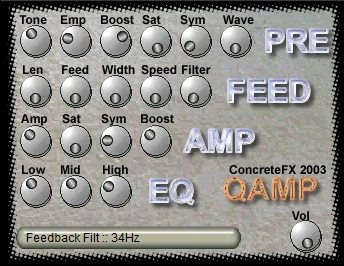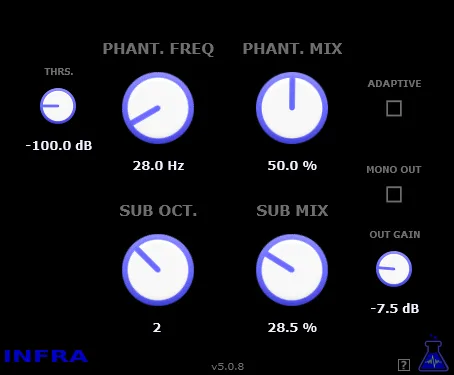Simulations of amplifiers are indispensable for creating unique sounds for guitars, bass, and other instruments in a digital studio. They provide access to a variety of tones without the need for physical equipment.
Qamp by ConcreteFX: Universal Amplifier Simulation
Qamp by ConcreteFX is a compact VST plugin for modeling amplifiers of different types. It easily integrates into your DAW, providing flexible tone shaping capabilities. Qamp offers its own structure for creating unique sounds through two main sections: preamp and amplifier simulation, supplemented by a feedback section and an equalizer, rather than imitating specific models.
Sound Control: Qamp Parameters
The plugin provides full control over the sound thanks to a number of parameters:
Preamp:
- Yone: Tone (brightness/warmth).
- Emp: Accent (frequency emphasis).
- Boost: Input gain (saturation, drive).
- Sat: Saturation (harmonics, compression).
- Syn: Rectification (overload character).
- Wave: Wave type/algorithm.
Feed Section:
- Len: Feedback length.
- Feed: Feedback volume.
- Width: Feedback width.
- Speed: Feedback speed.
- Filter: Feedback filter.
These parameters add special effects or shape a specific dynamic.
Amplifier Simulation:
- Model: Selection of the basic simulation type.
- Boost: Additional gain.
- Sat: Simulation saturation.
- Sym: Simulation rectification (overload character).
Equalizer:
Simple 3-band equalizer:
- Low: Low frequencies.
- Mid: Mid frequencies.
- Hi: High frequencies.
Conclusion
Qamp by ConcreteFX is a flexible VST plugin for amplifier simulation, which offers tone shaping capabilities through two main sections with saturation and rectification, as well as a feedback section and an equalizer. It allows you to experiment with the sound for guitars, bass or other instruments, adding the desired character. Available as VST for Windows (32-bit), Qamp can be a valuable addition to your digital studio. Try it to get the desired warmth, drive, or unique saturation.



